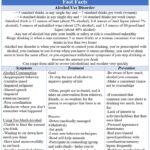How to recognize the signs?
Most people partake in drinking alcohol at some point in their lives. While an occasional drink isn’t a problem, it can become one if your drinking gets out of hand. How do you know if you have a problem related to alcohol use? What can you do to correct it?
 Definition
Definition
To understand what alcohol abuse is, we need to look at what is considered a safe amount of alcohol to consume. The amount of alcohol one can consume depends on the person’s gender. For women, it’s no more than three standard drinks in any single day and no more than seven standard drinks per week. For men, it’s no more than four standard drinks in any single day and no more than fourteen standard drinks per week. A standard drink is defined as 12 ounces of beer (about 5% alcohol), 8-9 ounces of malt liquor (about 7% alcohol), 5 ounces of unfortified wine (about 12% alcohol), and 1.5 ounces of 80-proof hard liquor (about 40% alcohol).
Any use of alcohol that puts your health or safety at risk is considered unhealthy. One example is binge drinking, which is when a man consumes five or more drinks or a woman consumes four or more drinks in less than two hours. Alcohol use disorder is when you’re unable to control your drinking, you’re preoccupied with alcohol, you continue to use it even when you know it’s causing problems, you need to drink more to have the same effect (build up tolerance), or you experience withdrawal symptoms if you stop drinking or decrease the amount you drink. The disorder can quickly escalate from mild to severe (alcoholism). Various factors, such as genetics, psychological, social and environmental, are thought to play a role in why someone develops alcohol use disorder. Certain things may increase your risk of developing it, such as starting drinking at an early age, family history of alcohol problems, having a mental health disorder, experiencing some form of trauma (physical or emotional), and being around social/cultural factors that encourage excessive alcohol use.
The more alcohol you consume, the higher the amount in your bloodstream, which results in you becoming more intoxicated and impaired. So, the more you drink, the more likely you are to experience behavior problems and mental changes, such as inappropriate behavior, unstable moods, impaired judgment, slurred speech, diminished attention/memory, poor coordination, and blackouts where you don’t remember anything that happened. Some signs that you may frequently be consuming too much alcohol are being unable to limit the amount you drink, wanting to cut down how much you drink and have tried unsuccessfully to do so, spending a great deal of time drinking/getting alcohol/recovering from alcohol use, or have intense cravings to drink. Other signs can include failure to fulfill major obligations due to repeated alcohol use, continuing to drink even though you know it’s causing problems, giving up/reducing activities you used to enjoy to drink/conceal drinking from others, using alcohol when it’s not safe to do so (ex. driving), and developing a tolerance or experience withdrawal symptoms if you don’t drink. Withdrawal symptoms can start several hours or days after your last intake of alcohol. Typically, it requires a period of heavy and prolonged alcohol use. Symptoms of withdrawal include sweating, rapid heart rate, hand tremors, difficulty sleeping, nausea/vomiting, hallucinations, restlessness/agitation, anxiety, and seizures.
Over time, repetitive consumption of too much alcohol can alter the normal functioning of your brain. It can cause episodes of short-term memory loss, disordered thinking, and lead to dementia that is permanent. Unfortunately, it affects more areas of your body than just your brain. Your liver helps to detoxify your blood, so excessive alcohol intake can cause hepatic steatosis (increased amounts of fat in the liver), alcoholic hepatitis (liver inflammation), and cirrhosis (irreversible destruction of liver tissue). Since alcohol passes through your stomach, it can significantly impact it by causing ulcers in your stomach/esophagus and gastritis (inflammation of your stomach lining). Alcohol consumption increases your blood pressure, can enlarge your heart, and raise your risk for heart failure and stroke. Also, you are more susceptible to diseases because alcohol weakens your immune system. These are only a few of the things you can experience if you regularly consume too much alcohol.
Treatment
Often people with an alcohol problem are in denial. It takes an intervention from relatives, friends, or co-workers to tell the individual they are concerned about the amount of drinking for the person to recognize that there is an issue. Once they realize it, they can seek treatment. The goal of treatment is to completely stop the use of alcohol to improve the quality of life. The process usually includes detox, which is medically managed withdrawal and is done at an inpatient treatment center or hospital. After detox, the individual learns new skills and follows a treatment plan to maintain an alcohol-free life. The person will learn about setting goals and new behavior techniques. In addition, they’ll read self-help manuals and participate in counseling (group and individual). Counseling is essential because it helps you to understand why you developed a problem with alcohol and helps to support your recovery process. Several medications are available to help reduce cravings, and these can be given in pill form or as an injection. It’s also essential to seek treatment for any medical conditions resulting from alcohol over-consumption.
Part of recovery involves changing your lifestyle. It’s critical to inform your family and friends that you aren’t drinking alcohol. Keep close the supportive ones who can help you through recovery and distance yourself from those who will hinder it. Don’t participate in activities that involve alcohol—form new hobbies or find new activities that don’t make your recovery more challenging. Healthy habits like participating in regular physical activity, eating well, getting adequate sleep and managing stress can make your recovery process easier. Some ways to decrease stress include yoga, meditation, or acupuncture.
Prevention
The first step in prevention is being aware of how much alcohol you consume and then making a consistent, conscious choice not to overindulge. If you are concerned that someone you care about is drinking too much, there are certain signs to look for. These signs can be a lack of interest in activities/hobbies that they once liked, appearance deteriorates, red eyes/slurred speech/problems with coordination/memory lapses frequently, problems at school/work, frequent mood changes, and defensive behavior or difficulties with friends. If you notice any of these, talk to your loved one about the amount of alcohol they are consuming.
Alcohol use disorder is a serious and life-threatening condition. Thankfully, there are ways to overcome it. If you have any questions or concerns, please speak with your doctor. If you would like more information, please visit Alcoholics Anonymous (AA) at https://www.aa.org/ or Women for Sobriety at https://womenforsobriety.org/ Some good resources for family and friends of alcoholics are Al-Anon (https://al-anon.org/)and Alateen (https://al-anon.org/for-members/group-resources/alateen/)